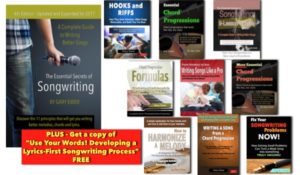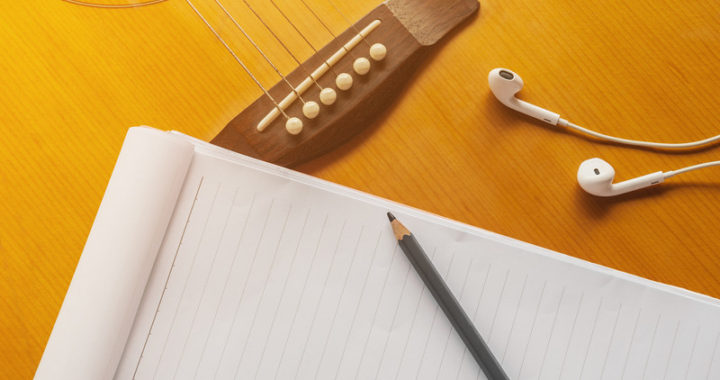If you’ve had that happy circumstance where, while trying to write a song, you get some amazing ideas that appear all at once, and you manage to write that new song in one siting, within a half hour or so, I think that’s wonderful. It’s also rare.
 If hooks seem elusive when you’re trying to write a song, give this ebook a read: “Hooks and Riffs: How They Grab Attention, Make Songs Memorable, and Build Your Fan Base.” Get it separately, or as part of “The Essential Secrets of Songwriting 10-eBook Bundle.”
If hooks seem elusive when you’re trying to write a song, give this ebook a read: “Hooks and Riffs: How They Grab Attention, Make Songs Memorable, and Build Your Fan Base.” Get it separately, or as part of “The Essential Secrets of Songwriting 10-eBook Bundle.”
While you may not find spontaneous writing yields complete songs within minutes, I think you’ve probably had it happen where a sizeable chunk of lyric, or a gorgeous melody/chord combination has happened, even if it’s not an entire song in one sitting. That’s also wonderful, and more common than writing a complete song on the same day.
Every time you write quickly, it’s exciting. It almost feels magical when fresh musical ideas flow easily. But there is a danger as well: when ideas happen quickly, we can get fooled into thinking that we’ve just created the best thing ever. And once you think you’ve written the best thing ever, you don’t usually keep looking.
Often that bit that will so easily come together will be a chorus hook. You strum some chords, and you get an immediate idea for a lyric, and it pops into your mind with the melody there! What usually takes you a full session of work has just occurred to you in 30 seconds!
When that happens, be sure you’re recording what you’re writing, because it might actually be the best fragment for that moment within your song.
But also consider this: The second thing you come up with might actually be better.
In other words, take that amazing fragment, and start experimenting:
- Try it in a new key, up or down, and notice what it does to the feel of the music, to the inherent meaning of the words, and to the general mood of that part of the song.
- Try it faster or slower, and see if some new feel comes forward.
- Switch the mode. If you’ve worked out something in a minor key, see what it sounds like in relative major (i.e., switch from A minor to C major), or in parallel major (i.e., switch from A minor to A major).
- Switch the time signature. Most musical ideas come to us in 4/4 time, so see if 3/4 sounds even better. You can also try something more complex, like 7/6, 5/4, or something else. If you need a bit more info on this, please read my post from this past summer, “Breaking Free from 4/4 Time in Your Songwriting.”
In other words, keep looking. Don’t automatically assume that ideas that come quickly are exempt from improvement. More often than not, you’ll find that second ideas are often better than first ones.
 Written by Gary Ewer. Follow Gary on Twitter.
Written by Gary Ewer. Follow Gary on Twitter.
 Clean up your songwriting technique starting TODAY. Get “The Essential Secrets of Songwriting 10-eBook Bundle”, and get an 11th eBook FREE: “Use Your Words! Developing a Lyrics-First Songwriting Process”
Clean up your songwriting technique starting TODAY. Get “The Essential Secrets of Songwriting 10-eBook Bundle”, and get an 11th eBook FREE: “Use Your Words! Developing a Lyrics-First Songwriting Process”










